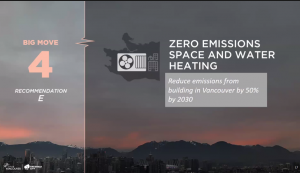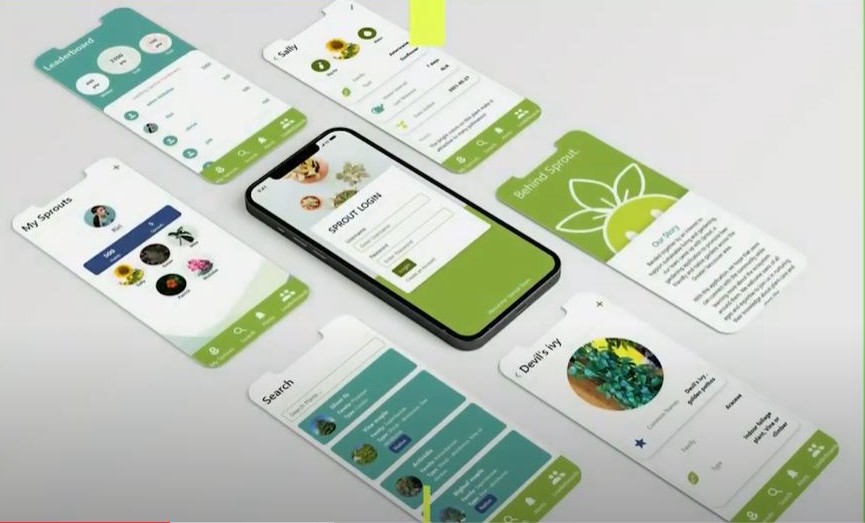The first year of the Computer Systems Technology Diploma culminates in an end-to-end app building term where students combine everything they’ve learned to work on an actual product.
Tackling the climate emergency
This year this 5-week full time May project term was launched with help from guest speakers Brad Badelt of the City of Vancouver, and Ileana Costrut of CityStudio Vancouver, the local innovation and collaboration hub. Together they introduced students to key sustainability issues facing Vancouver as it grapples with the Greenest City Climate Emergency.

Brad covered some stark information on as-yet unachieved climate goals. At the project launch, 85% of these computing students rated their familiarity with Vancouver’s Climate Emergency Action Plan at “not at all.” To the surprise of most, the biggest carbon impact in Vancouver comes from buildings, via heating buildings and hot water with gas. These are the most critical and most difficult emissions to curb, according to Brad. The second largest area of potential impact is transportation. Given the importance of tackling these challenges, Brad told the group “I’m always excited to see what kind of projects come out of student ideas.”
The 220 students, grouped in 51 teams, were also given the option of creating something related in any way to friendship, in addition to the municipal themes of climate emergency, circular economy, citizen science, carbon footprint, and pathways to democratic participation.
Multiple facets of software development
Project demo day emcee and faculty member Patrick Guichon explained the multifaceted skills students need to bring to these projects: “there’s more to building an app than just writing code. You have to create a vision for your project, wireframes, and User Interface (UI) designs. You need to select, and sometimes re-evaluate, the appropriate technologies to use. You have to estimate and budget your time, prioritize your tasks, and coordinate many schedules. You need to work on a shared code base, test and debug your code to ensure a robust and functional solution.”
“While all these things are necessary and important, they aren’t what many typically think of first, when we think about coding an application. This project term gives students a chance to experience these other aspects of software design beyond simple programming skills,” Patrick tells us.
Some of the highlights from the instructional side? “It’s great to see students tell us, as instructors, that they struggled and overcame interpersonal issues through respectful and continual communication. Or that they really learned how to properly use source code versioning software to collaborate effectively, or master project management tools to keep on task and complete their critical features.”
“This project term gives students a chance to experience these other aspects of software design beyond simple programming skills” – Patrick Guichon, Faculty
Diverse and innovative solutions
The resulting apps were diverse, tackling sustainability issues including food waste, biodiversity, and carbon footprint calculation.
After seeing the final projects, Ileana said “it was a great experience, and really interesting to see what the students can accomplish in such a short period of time!” She told the students she was impressed by the innovative ways they chose to tackle this complex challenge, “showing us the power of mobile applications to advance meaningful and fun climate action.” Ileana emphasized that “cities are better when we build them together.”
And the winners are…
The term wrapped with lead faculty Chris Thompson and Carly Orr congratulating all students for performing well and bringing out the best in themselves and each other. They stressed that it has been a challenging end to a taxing year. Students had to meet short deadlines that included weekly “surprises” to deal with: planted into the project experience as such things often are. They also emphasized key qualities shown by so many successful teams: kindness, empathy, resilience, respect, excellent communication, and good humour.
After many hours of demos, the audience voted. Save Raincity took Most Innovative and Best Teamwork for its first person mayor game. Sellery, a virtual farmer’s market, won Most Useful. Team Sprout took Best Design for connecting urban gardeners to relevant ecological information.
Check out the amazing work of our winners and runners up!
Keep up with the latest at BCIT Computing – sign up for our Tech It Out quarterly newsletter.
Featured image: App by team sprout, winner of Best Design
